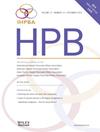Microwave ablation versus radiofrequency ablation for hepatocellular carcinoma in patients with decompensated cirrhosis
IF 2.4
3区 医学
Q2 GASTROENTEROLOGY & HEPATOLOGY
引用次数: 0
Abstract
Background
The efficacy of microwave ablation (MWA) and radiofrequency ablation (RFA) in hepatocellular carcinoma (HCC) patients with decompensated cirrhosis remains unclear.
Methods
A total of 315 patients with decompensated cirrhosis and HCC who underwent MWA or RFA were recruited. Recurrence beyond the Milan criteria (RBM), local tumor progression (LTP), overall survival (OS), and complications were evaluated and compared.
Results
After propensity score matching, the overall liver-related complication rates were 12.1 % in the current study. The cumulative RBM rates were lower in patients treated with MWA compared to those treated with RFA (21.9 % vs. 23.4 % at 1 year; 42.3 % vs. 66.8 % at 5 years; p = 0.016). In addition, lower cumulative rates of LTP were found in patients treated with MWA compared to those treated with RFA (6.2 % vs. 19.9 % at 1 year; 14.7 % vs. 27.8 % at 3 years; p = 0.032). The OS rates at 1 and 5 years were 89.9 % and 58.9 % in the MWA group, and 80.7 %, and 38.9 % in the RFA group, respectively (p = 0.105).
Conclusion
HCC patients with decompensated cirrhosis can undergo MWA or RFA with acceptable mortality, morbidity and liver-rated complications rates. MWA demonstrates superiority over RFA in tumor control.
微波消融术与射频消融术治疗失代偿期肝硬化患者的肝细胞癌。
背景:微波消融(MWA)和射频消融(RFA)治疗伴有失代偿期肝硬化的肝细胞癌(HCC)患者的疗效尚不清楚。方法:共315例失代偿期肝硬化和HCC患者行MWA或RFA。评估和比较超过米兰标准的复发率(RBM)、局部肿瘤进展(LTP)、总生存期(OS)和并发症。结果:倾向评分匹配后,当前研究中肝脏相关并发症的总发生率为12.1%。与接受RFA治疗的患者相比,接受MWA治疗的患者累积RBM率较低(1年时21.9% vs. 23.4%;42.3% vs. 5年66.8%;p = 0.016)。此外,与RFA治疗的患者相比,MWA治疗的患者LTP累积率较低(1年时为6.2%对19.9%;14.7% vs. 3年27.8%;p = 0.032)。MWA组1年和5年的总生存率分别为89.9%和58.9%,RFA组80.7%和38.9% (p = 0.105)。结论:HCC伴失代偿性肝硬化患者可接受MWA或RFA,死亡率、发病率和肝脏并发症发生率均可接受。MWA在肿瘤控制方面优于RFA。
本文章由计算机程序翻译,如有差异,请以英文原文为准。
求助全文
约1分钟内获得全文
求助全文
来源期刊

Hpb
GASTROENTEROLOGY & HEPATOLOGY-SURGERY
CiteScore
5.60
自引率
3.40%
发文量
244
审稿时长
57 days
期刊介绍:
HPB is an international forum for clinical, scientific and educational communication.
Twelve issues a year bring the reader leading articles, expert reviews, original articles, images, editorials, and reader correspondence encompassing all aspects of benign and malignant hepatobiliary disease and its management. HPB features relevant aspects of clinical and translational research and practice.
Specific areas of interest include HPB diseases encountered globally by clinical practitioners in this specialist field of gastrointestinal surgery. The journal addresses the challenges faced in the management of cancer involving the liver, biliary system and pancreas. While surgical oncology represents a large part of HPB practice, submission of manuscripts relating to liver and pancreas transplantation, the treatment of benign conditions such as acute and chronic pancreatitis, and those relating to hepatobiliary infection and inflammation are also welcomed. There will be a focus on developing a multidisciplinary approach to diagnosis and treatment with endoscopic and laparoscopic approaches, radiological interventions and surgical techniques being strongly represented. HPB welcomes submission of manuscripts in all these areas and in scientific focused research that has clear clinical relevance to HPB surgical practice.
HPB aims to help its readers - surgeons, physicians, radiologists and basic scientists - to develop their knowledge and practice. HPB will be of interest to specialists involved in the management of hepatobiliary and pancreatic disease however will also inform those working in related fields.
Abstracted and Indexed in:
MEDLINE®
EMBASE
PubMed
Science Citation Index Expanded
Academic Search (EBSCO)
HPB is owned by the International Hepato-Pancreato-Biliary Association (IHPBA) and is also the official Journal of the American Hepato-Pancreato-Biliary Association (AHPBA), the Asian-Pacific Hepato Pancreatic Biliary Association (A-PHPBA) and the European-African Hepato-Pancreatic Biliary Association (E-AHPBA).
 求助内容:
求助内容: 应助结果提醒方式:
应助结果提醒方式:


